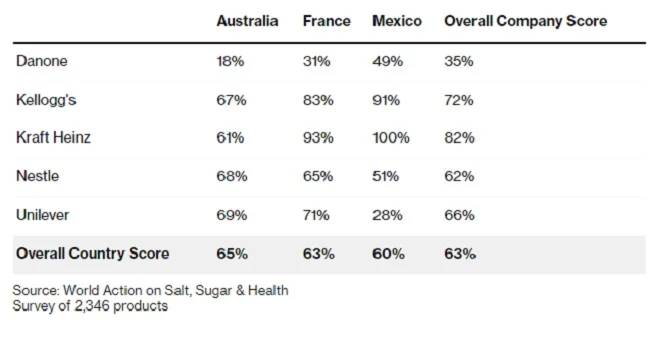The vast majority of food and beverages sold by four of the world’s five largest industries do not meet the standards set by global organizations for “healthy” food.
Referring to the analysis of the non-governmental organization World Action on Salt, Sugar & Health (“Παγκόσμια δράση για το αλάτι, τη ζάχαρη και την υγεία”), Bloomberg presents the performance of the five giants of the food market based on the most widely used standards – Star Health Rating, Nutri- Score και Warning Labels, writes the Greek edition dikaiologitika.gr.
The analysis covers the industries Danone, Kellogg Co., Kraft Heinz, Nestle SA and Unilever Plc, while the figures cover the markets of Australia, France and Mexico. “Improving the nutritional content of food and beverages by reformulating recipes to use less salt, sugar and saturated fat is by far the most important strategy any company must adopt to improve public health,” said Mhairi Brown, Head of Division policy and public relations WASSH. “However, relying solely on industry readiness, and without government enforcement, we are unlikely to see meaningful change.”
According to Bloomberg, worst performance of the five giants, Kraft Heinz, while Danone is doing better, as most of its products seem to “pass the required minimum.”
As shown in the table, four-fifths of Kraft Heinz products did not meet hygiene standards in three markets, while in Mexico none of the available products met specifications.
About 72% of Kellogg’s products and 66% of Unilever products reviewed in the study did not meet the criteria, with only Danone resisting the trend. In particular, 35% of its products are rated below the standard, with a few days ago the company promised that at least 90% of products based on sales volume in the UK and Ireland would no longer be high in sugar, salt or fat.
As Bloomberg comments, food companies are forced to make their products healthieras obesity becomes the #1 public health crisis in countries like the US.
According to the report, the global economic impact of being overweight is expected to more than double, to $4.27 trillion, in 2035 from 2020 levels.







More Stories
Is Europe ready for a disaster at the Zaporozhye nuclear power plant (video)
"The international arms trade is still less regulated than the banana trade"
Agios Anargyros: new documentary video about the murder of Kyriaki Griva